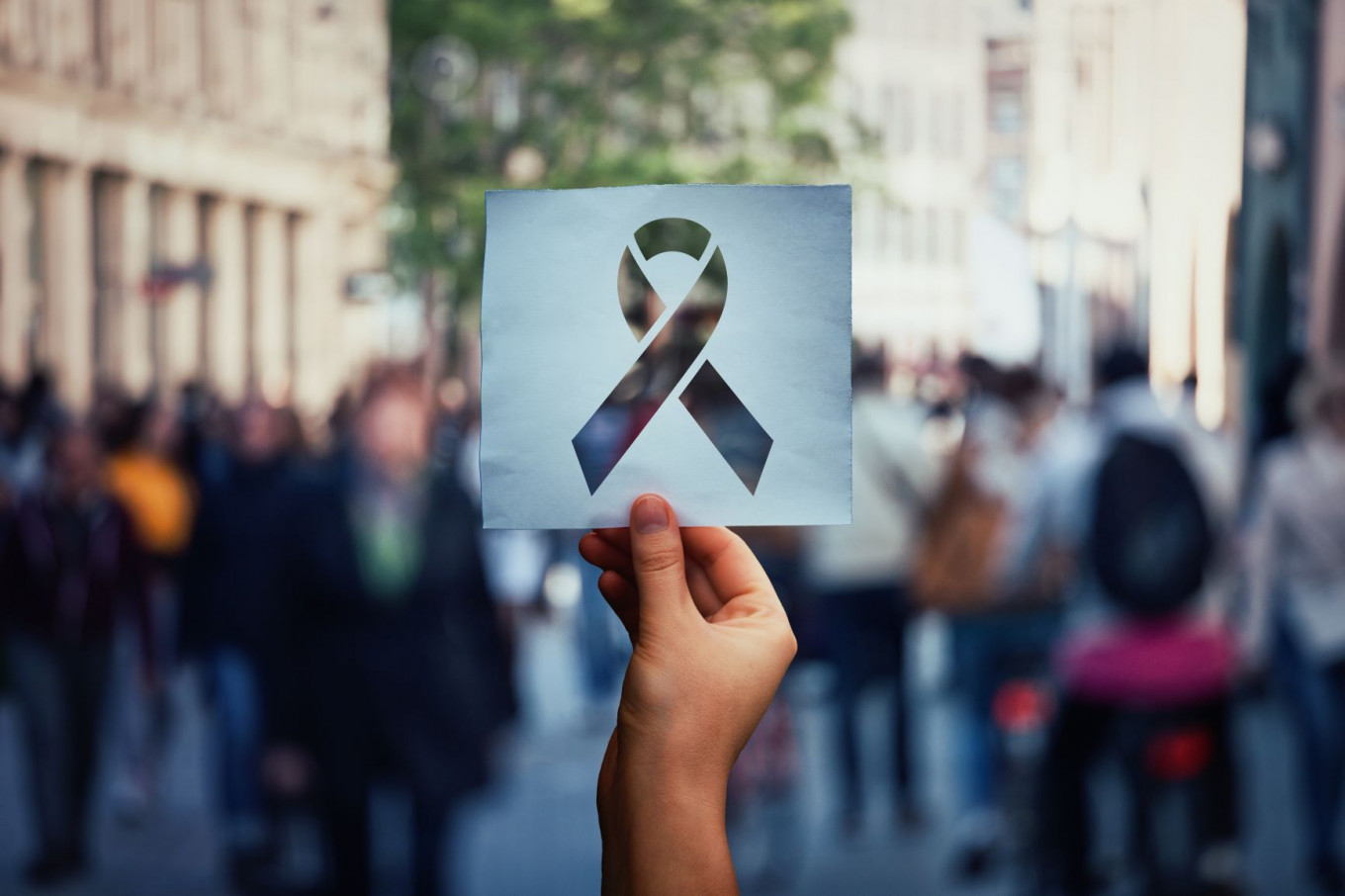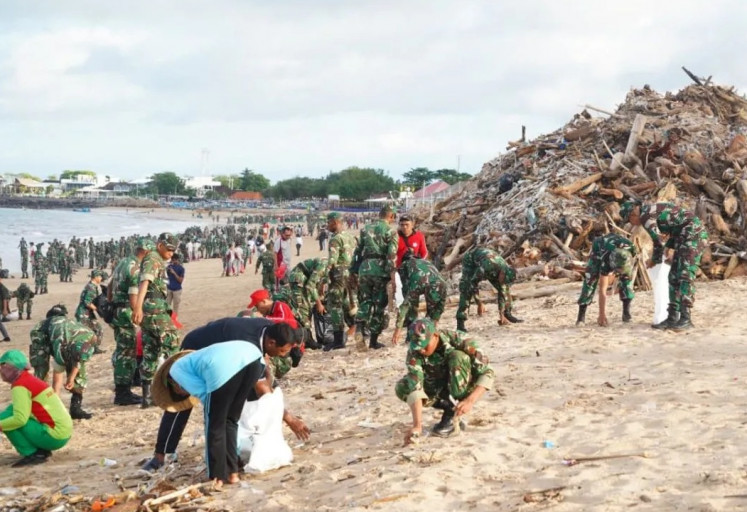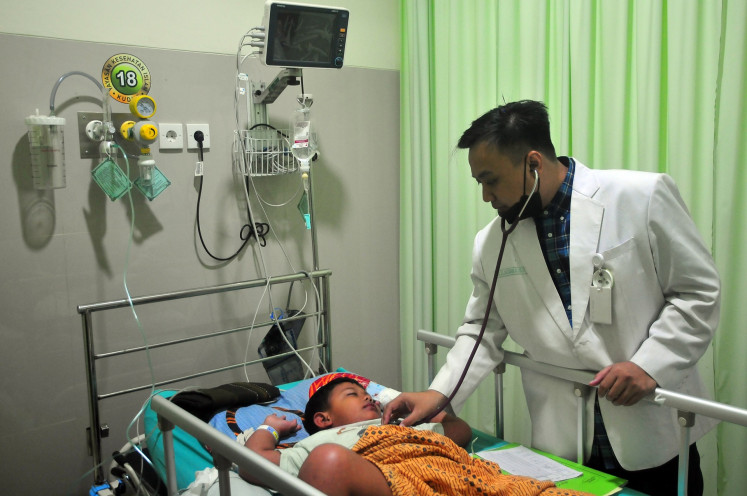Popular Reads
Top Results
Can't find what you're looking for?
View all search resultsPopular Reads
Top Results
Can't find what you're looking for?
View all search resultsEqualize! Unite to end the inequalities holding back the end of AIDS for women, children.
Harmful gender and social norms as well as legal barriers greatly hamper the HIV response, as fear of discrimination and criminalization makes key populations avoid accessing services.
Change text size
Gift Premium Articles
to Anyone
S
arah is a woman living with HIV. Despite living in Kalimantan, Sarah and her husband travel to Jakarta every two months for antiretroviral (ARV) treatment to keep them healthy.
She goes all the way to Jakarta not because ARV is not available in Kalimantan, but because she believes she has to “keep her husband and family’s good name” by hiding their status. If she discloses their status to the people around them, she fears her husband will be forced to divorce her.
The story of Sarah is just one of the many experiences faced by women living with HIV in Indonesia and around the world. Such struggles persist because the AIDS response is in danger.
Inequalities are the reason why. UNAIDS new report Dangerous Inequalities shows that unequal access to information, health services, science, human rights protection, and resources is holding back the end of AIDS. Dangerous Inequalities unpacks the impact on the AIDS response of gender inequalities, of inequalities faced by key populations, and of inequalities between children and adults.
In 2021, globally, women accounted for 49 percent of new HIV infections and in Indonesia not far behind, women now accounted for 40 percent of new HIV infections. Adult women in Indonesia are also less likely to be on antiretroviral therapy than adult men, with coverage of 24 percent for women and 31 percent for men.
For Sarah and other women living with HIV in Indonesia, their well-being isn’t just about ARV treatment access and adherence. It is also dependent on how social norm, patriarchy, and their bargaining position may put them at higher risk for gender-based violence that in turn will create barriers for accessing ARV treatment, thus affecting their overall quality of life.
Meeting the needs and priorities of women living with HIV, women and girls in all diversity should ensure equal access to affordable, available, acceptable, and high-quality public goods and services.
Harmful gender and social norms as well as legal barriers greatly hamper the HIV response, as fear of discrimination and criminalization makes key populations avoid accessing services. Studies have shown that people living with HIV who perceive high levels of HIV-related stigma are 2,4 times more likely to delay enrolment in care until they are very ill.
Gender-based violence also increases women’s risks of HIV infection and constrains the access of women living with HIV to life-savings services. During the COVID-19 pandemic, data shows that women in Indonesia carried a disproportionate burden of care – globally 512 billion additional hours during the pandemic – at home taking care of family members – clearly this takes up much of women’s time that can be used to fulfil their opportunities for their own education and employment.
The global report shows that the AIDS response is being held back by inequalities in access to treatment between adults and children. While over three quarters of adults living with HIV are on antiretroviral therapy, just over half of children living with HIV are on the lifesaving medicine. This has had deadly consequences.
In 2021, children accounted for only 4 percent of all people living with HIV but 15 percent of all AIDS-related deaths. In Indonesia, children accounted for 12 percent of 27,000 new HIV infections, but 9 percent of 26,000 AIDS-related deaths. Only 1 in 4 children living with HIV accessed ARV. Closing the treatment gap for children will save lives.
The situation we are facing is grim. We are leaving women and children behind and we are failing them. These dangerous inequalities are undermining the AIDS response and jeopardizing the health security of everyone. But this is not a counsel of despair. It is a call to action.
Inequalities in health are not inevitable. Governments have the power to protect women against gender-based violence and to protect children and young people by investing in education and health. Community-led organizations have the capacity to make a difference in the HIV response.
All over the world, people are mobilizing to challenge the injustices that keep people away from lifesaving HIV treatment, care and prevention services. Determined advocacy by civil society organizations around the globe is winning the repeal of harmful laws that obstruct access to services.
While COVID-19 has disrupted HIV testing and treatment initiation and adherence, we must now rein in all our resources and partnerships to ensure that we reach all vulnerable groups in need and get the HIV response back on track.
Recognizing that changing gender unequal norms and promoting equality is critical to the HIV response, UN Women works with the Indonesian Positive Women Network (IPPI) to increase the capacity and leadership of women living with HIV to realize their rights and engage in decision-making processes of the HIV response, this includes making available for easy data input by community members an online reporting system to record and track data on gender-based violence.
This year UNAIDS Indonesia together with IPPI, Pelita Ilmu Foundation, and Lentera Anak Pelangi initiated a national alliance to end AIDS in children. Alliance members are united in the conviction that every challenge is surmountable through partnership.
The national alliance will strengthen and expand capacity of HIV implementing partners to reach women like Sarah to provide support to women and children to access timely comprehensive services to improve their well-being and quality of life.
While we have had to focus on COVID-19 in this past few years, other pandemics still exist and we must not be complacent: millions of lives are at stake and too many of these lives are women and children. Globally, 650 000 people died of AIDS-related deaths in 2021 and there were 1.5 million new HIV infections –1 million above the 2020 target of 500 000.
Together, it is possible to end AIDS by 2030 but only if governments and communities act now to equalize access to HIV services for everyone. Tackling inequalities will not only help the marginalized. It will help everyone.
***
Krittayawan Boonto is UNAIDS country director Indonesia. Jamshed M. Kazi is UN Women Indonesia representative, Ayu Oktariani is national coordinator of the Indonesian Positive Women Network (IPPI).











